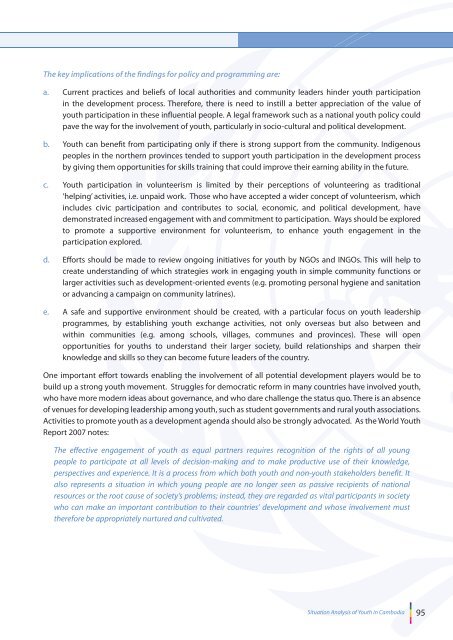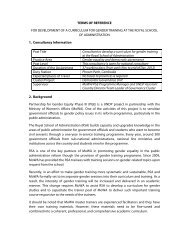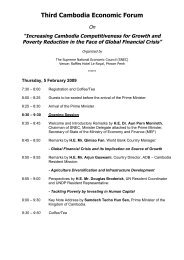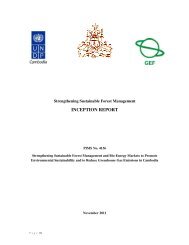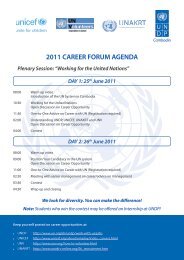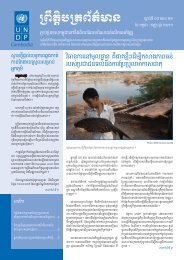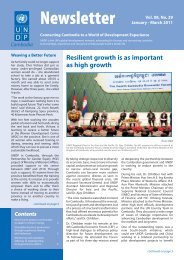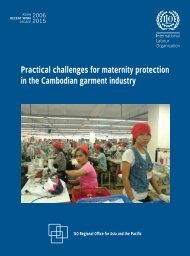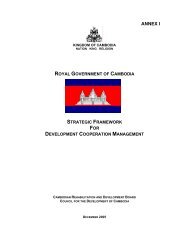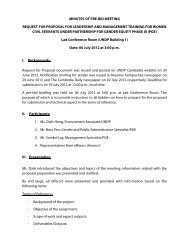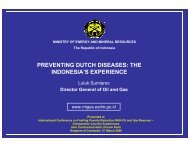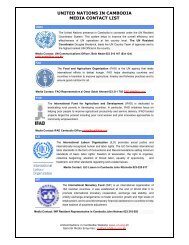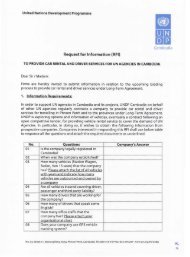UN Analysis Final.pdf - United Nations in Cambodia
UN Analysis Final.pdf - United Nations in Cambodia
UN Analysis Final.pdf - United Nations in Cambodia
Create successful ePaper yourself
Turn your PDF publications into a flip-book with our unique Google optimized e-Paper software.
The key implications of the f<strong>in</strong>d<strong>in</strong>gs for policy and programm<strong>in</strong>g are:<br />
a. Current practices and beliefs of local authorities and community leaders h<strong>in</strong>der youth participation<br />
<strong>in</strong> the development process. Therefore, there is need to <strong>in</strong>still a better appreciation of the value of<br />
youth participation <strong>in</strong> these <strong>in</strong>fluential people. A legal framework such as a national youth policy could<br />
pave the way for the <strong>in</strong>volvement of youth, particularly <strong>in</strong> socio-cultural and political development.<br />
b. Youth can benefit from participat<strong>in</strong>g only if there is strong support from the community. Indigenous<br />
peoples <strong>in</strong> the northern prov<strong>in</strong>ces tended to support youth participation <strong>in</strong> the development process<br />
by giv<strong>in</strong>g them opportunities for skills tra<strong>in</strong><strong>in</strong>g that could improve their earn<strong>in</strong>g ability <strong>in</strong> the future.<br />
c. Youth participation <strong>in</strong> volunteerism is limited by their perceptions of volunteer<strong>in</strong>g as traditional<br />
‘help<strong>in</strong>g’ activities, i.e. unpaid work. Those who have accepted a wider concept of volunteerism, which<br />
<strong>in</strong>cludes civic participation and contributes to social, economic, and political development, have<br />
demonstrated <strong>in</strong>creased engagement with and commitment to participation. Ways should be explored<br />
to promote a supportive environment for volunteerism, to enhance youth engagement <strong>in</strong> the<br />
participation explored.<br />
d. Efforts should be made to review ongo<strong>in</strong>g <strong>in</strong>itiatives for youth by NGOs and INGOs. This will help to<br />
create understand<strong>in</strong>g of which strategies work <strong>in</strong> engag<strong>in</strong>g youth <strong>in</strong> simple community functions or<br />
larger activities such as development-oriented events (e.g. promot<strong>in</strong>g personal hygiene and sanitation<br />
or advanc<strong>in</strong>g a campaign on community latr<strong>in</strong>es).<br />
e. A safe and supportive environment should be created, with a particular focus on youth leadership<br />
programmes, by establish<strong>in</strong>g youth exchange activities, not only overseas but also between and<br />
with<strong>in</strong> communities (e.g. among schools, villages, communes and prov<strong>in</strong>ces). These will open<br />
opportunities for youths to understand their larger society, build relationships and sharpen their<br />
knowledge and skills so they can become future leaders of the country.<br />
One important effort towards enabl<strong>in</strong>g the <strong>in</strong>volvement of all potential development players would be to<br />
build up a strong youth movement. Struggles for democratic reform <strong>in</strong> many countries have <strong>in</strong>volved youth,<br />
who have more modern ideas about governance, and who dare challenge the status quo. There is an absence<br />
of venues for develop<strong>in</strong>g leadership among youth, such as student governments and rural youth associations.<br />
Activities to promote youth as a development agenda should also be strongly advocated. As the World Youth<br />
Report 2007 notes:<br />
The effective engagement of youth as equal partners requires recognition of the rights of all young<br />
people to participate at all levels of decision-mak<strong>in</strong>g and to make productive use of their knowledge,<br />
perspectives and experience. It is a process from which both youth and non-youth stakeholders benefit. It<br />
also represents a situation <strong>in</strong> which young people are no longer seen as passive recipients of national<br />
resources or the root cause of society’s problems; <strong>in</strong>stead, they are regarded as vital participants <strong>in</strong> society<br />
who can make an important contribution to their countries’ development and whose <strong>in</strong>volvement must<br />
therefore be appropriately nurtured and cultivated.<br />
Situation <strong>Analysis</strong> of Youth <strong>in</strong> <strong>Cambodia</strong><br />
95


